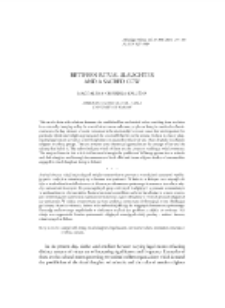- Search in all Repository
- Literature and maps
- Archeology
- Mills database
- Natural sciences
Advanced search
Advanced search
Advanced search
Advanced search
Advanced search

Object
Title: Between Ritual Slaughter and a Sacred Cow
Subtitle:
Ethnologia Polona 37 2016 (2017)
Publisher:
Institute of Archaeology and Ethnology Polish Academy of Sciences
Place of publishing:
Description:
Type of object:
Abstract:
This article deals with relations between the established law and ethical values resulting from tradition in a culturally changing reality. In a world where more and more people are living in multicultural environments, the key element of social consensus is the relationship between values that are important for particular ethnic and religious groups and the law established in public society. Culture is a factor shaping the legal system as well as controlling behaviors assessed normatively and often diversely in different religious or ethnic groups. This text presents some theoretical approaches to the concept of law and the culture that builds it. The author indicates which of them are the closest to reaching a social consensus. The analyzed issue in this article is illustrated through the problem of differing approaches to animals and their slaughter and through the statements of both rabbi and imam religious leaders of communities engaged in ritual slaughter, living in Poland
References:
Abi Issa A. 1999. Komentarz czterdziestu Hadisów Nałałija, Stowarzyszenie Studentów Muzułmańskich w Polsce, Białystok
Barth F. 2002. Toward a Richer Description and Analysis of Cultural Phenomena. In R.G. Fox and B.J. King (eds.), Anthropology Beyond Culture, Oxford – New York, 23–36
Engle Merry S. 1997. Legal Pluralism and Transnational Culture: The Ka Ho’okolokolonui Kanaka Maoli Tribunal, Hawaii, 1993. In R.A. Wilson (ed.) Human Rights, Culture and Context, London, Chicago, Illinois, 28–47
Fox R. 1987. The Disunity of Anthropology and the Unity of Mankind. In K. Moore (ed.), Way Marks, Notre Dam USA, 17–42
Glock H.- J. 2001. Słownik wittgensteinowski, Warszawa
Goodale M. 2006. Ethical Theory as Social Practice, American Anthropologist 108 (1 March), 25–37
Krysińska-Kałużna M. 1999. Relatywizm kulturowy a prawa człowieka, Lud 83, 11–31
Lakoff G. 1987. Women, Fire and Dangerous Things: What Categories Reveal About the Mind, Chicago
Messer E. 1993. Anthropology and Human Rights, Annual Review of Anthropology 22, 221–249
Messer E. 1997. Pluralist approaches to Human Rights, Journal of Anthropological Research 53, 293–317
Pedersen S. 1991. National Bodies, Unspeakable Acts: The Sexual Politics of Colonial Policy-Making, The Journal of Modern History 63 (4, Dec.), 647–680
Sarkowicz R. and Stelmach J. 1996. Teoria prawa, Kraków
Smith M. W. 1955. Continuity in Culture Contact: Examples from Southern British Columbia, Man 55, 100–105
Stoińska-Kairska I. 2002. Lengua y educación frente a la pervivencia de las culturas nativas de America Latina, Estudios Latinoamericanos 22, 31–67
Van der Kroef J. M. 1959. Culture Contact and Culture Conflict in Western New Guinea, Anthro¬pological Quarterly 32 (3), 134–160
Wittgenstein L. 2000. Dociekania filozoficzne, Warszawa
Woleński J. 1983. Ludwig Wittgenstein o naturze refleksji filozoficznej. In Z. Kuderowicz (ed.), Filozofia współczesna 2, Warszawa, 6–20
Relation:
Volume:
Start page:
End page:
Detailed Resource Type:
Format:
Resource Identifier:
oai:rcin.org.pl:66282 ; 0137-4079
Source:
IAiE PAN, call no. P 366 ; IAiE PAN, call no. P 367 ; IAiE PAN, call no. P 368 ; click here to follow the link
Language:
Rights:
Digitizing institution:
Institute of Archaeology and Ethnology of the Polish Academy of Sciences
Original in:
Library of the Institute of Archaeology and Ethnology of the Polish Academy of Sciences
Access:
Object collections:
- Digital Repository of Scientific Institutes > Partners' collections > Institute of Archeology and Ethnology PAS > Institute Publications
- Digital Repository of Scientific Institutes > Partners' collections > Institute of Archeology and Ethnology PAS > Institute Publications > Current Journals
- Digital Repository of Scientific Institutes > Literature > Books/Chapters
- Digital Repository of Scientific Institutes > Literature > Journals/Articles
- Digital Repository of Scientific Institutes > Partners' collections > Institute of Archeology and Ethnology PAS > Institute Publications > Current Journals > Ethnologia Polona
Last modified:
Feb 2, 2022
In our library since:
Sep 26, 2018
Number of object content downloads / hits:
106
All available object's versions:
https://rcin.org.pl./publication/85959
Show description in RDF format:
Show description in RDFa format:
Show description in OAI-PMH format:
| Edition name | Date |
|---|---|
| Krysińska-Kałużna, Magdalena, 2017, Between Ritual Slaughter and a Sacred Cow | Feb 2, 2022 |
Objects Similar
Zeidler-Janiszewska, Anna
Zeidler-Janiszewska, Anna Pawluk, Rafał

 INSTYTUT ARCHEOLOGII I ETNOLOGII POLSKIEJ AKADEMII NAUK
INSTYTUT ARCHEOLOGII I ETNOLOGII POLSKIEJ AKADEMII NAUK
 INSTYTUT BADAŃ LITERACKICH POLSKIEJ AKADEMII NAUK
INSTYTUT BADAŃ LITERACKICH POLSKIEJ AKADEMII NAUK
 INSTYTUT BADAWCZY LEŚNICTWA
INSTYTUT BADAWCZY LEŚNICTWA
 INSTYTUT BIOLOGII DOŚWIADCZALNEJ IM. MARCELEGO NENCKIEGO POLSKIEJ AKADEMII NAUK
INSTYTUT BIOLOGII DOŚWIADCZALNEJ IM. MARCELEGO NENCKIEGO POLSKIEJ AKADEMII NAUK
 INSTYTUT BIOLOGII SSAKÓW POLSKIEJ AKADEMII NAUK
INSTYTUT BIOLOGII SSAKÓW POLSKIEJ AKADEMII NAUK
 INSTYTUT CHEMII FIZYCZNEJ PAN
INSTYTUT CHEMII FIZYCZNEJ PAN
 INSTYTUT CHEMII ORGANICZNEJ PAN
INSTYTUT CHEMII ORGANICZNEJ PAN
 INSTYTUT FILOZOFII I SOCJOLOGII PAN
INSTYTUT FILOZOFII I SOCJOLOGII PAN
 INSTYTUT GEOGRAFII I PRZESTRZENNEGO ZAGOSPODAROWANIA PAN
INSTYTUT GEOGRAFII I PRZESTRZENNEGO ZAGOSPODAROWANIA PAN
 INSTYTUT HISTORII im. TADEUSZA MANTEUFFLA POLSKIEJ AKADEMII NAUK
INSTYTUT HISTORII im. TADEUSZA MANTEUFFLA POLSKIEJ AKADEMII NAUK
 INSTYTUT JĘZYKA POLSKIEGO POLSKIEJ AKADEMII NAUK
INSTYTUT JĘZYKA POLSKIEGO POLSKIEJ AKADEMII NAUK
 INSTYTUT MATEMATYCZNY PAN
INSTYTUT MATEMATYCZNY PAN
 INSTYTUT MEDYCYNY DOŚWIADCZALNEJ I KLINICZNEJ IM.MIROSŁAWA MOSSAKOWSKIEGO POLSKIEJ AKADEMII NAUK
INSTYTUT MEDYCYNY DOŚWIADCZALNEJ I KLINICZNEJ IM.MIROSŁAWA MOSSAKOWSKIEGO POLSKIEJ AKADEMII NAUK
 INSTYTUT PODSTAWOWYCH PROBLEMÓW TECHNIKI PAN
INSTYTUT PODSTAWOWYCH PROBLEMÓW TECHNIKI PAN
 INSTYTUT SLAWISTYKI PAN
INSTYTUT SLAWISTYKI PAN
 SIEĆ BADAWCZA ŁUKASIEWICZ - INSTYTUT TECHNOLOGII MATERIAŁÓW ELEKTRONICZNYCH
SIEĆ BADAWCZA ŁUKASIEWICZ - INSTYTUT TECHNOLOGII MATERIAŁÓW ELEKTRONICZNYCH
 MUZEUM I INSTYTUT ZOOLOGII POLSKIEJ AKADEMII NAUK
MUZEUM I INSTYTUT ZOOLOGII POLSKIEJ AKADEMII NAUK
 INSTYTUT BADAŃ SYSTEMOWYCH PAN
INSTYTUT BADAŃ SYSTEMOWYCH PAN
 INSTYTUT BOTANIKI IM. WŁADYSŁAWA SZAFERA POLSKIEJ AKADEMII NAUK
INSTYTUT BOTANIKI IM. WŁADYSŁAWA SZAFERA POLSKIEJ AKADEMII NAUK




































